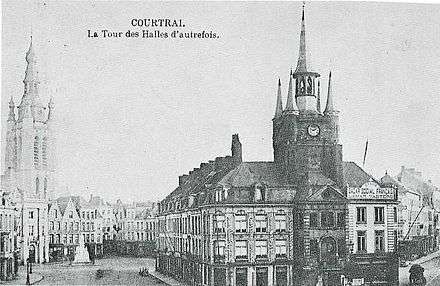Grote Markt (Kortrijk)
The Grote Markt ![]()
.jpg)
Its location on the crossing of some of Kortrijk's most famous and most touristic spots makes the Grote Markt one of the city's busiest squares. However, it has been pedestrian-friendly after its renewal in 1999–2000 since the largest part of the square is now a pedestrian area.
History

The square got its current shape and surface after the demolition of the old Cloths Halls around the still existing Kortrijk Belfry. Its L-shaped form is due to the contours of the Medieval Castle of Kortrijk which used to border the eastern side of the current square.
Events
The Grote Markt is often used for cultural and other events, as is the case for Kortrijk's other big squares, such as the Schouwburgplein (Theatre Square) and the Veemarkt.
Annually events that are organised on the Grote Markt include:
- Paasfoor
- Sinksenfeesten
- Summer Carnival
- Vlastreffen
Every Monday morning, the food and clothes market is held on the Grote Markt.